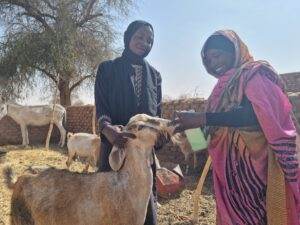Sudan: Where conflict and climate change combine with deadly results when left un-checked
Solutions come from acknowledging the source of a problem. In this article, our director for Africa, Akinyi Walender, assesses the conflict in Sudan and highlights how climate change is not a tomorrow issue, but a factor that undermines stability and sows the seeds of violence.

Practical Action Africa Director, Akinyi Walender
“I have worked in Sudan and called it home, for more than ten years. I have experienced for myself the incredible generosity and warmth of the people there, so it was devastating to see the lives of friends, colleagues and former colleagues turned upside down in a matter of days.
“The speed and ferocity at which the conflict erupted caught many, including me, by surprise. But the reality is, we should have predicted it.
For decades, Sudan, and much of the Sahel region, has witnessed political and social instability and it is no coincidence that rapid climatic and environmental change has occurred throughout this time.
Few places on Earth have been so severely affected by the changing climate. Statistics from a United Nations Environment Programme report from as early as 2007 are stark. It found: The desert in northern Sudan had advanced southwards by 60 miles in 40 years; Rainfall has dropped by at least 16%; Two-thirds of the forests in north, central and eastern Sudan disappeared between 1972 and 2001;
In the west, in Darfur, a third of the forests cover was lost between 1973 and 2006.
That report was written more than 15 years ago and climate change and environmental degradation has, if anything, accelerated across the Sahel region since then, according to a new report by World Weather Attribution.
Such a rapid decline in natural resources impacts communities living there. Different ethnic groups who had lived side by side for generations have been in conflict over access to farmland, grazing land and, of course, water.
Nowhere has this caused more suffering than in the western region of Darfur, where conflict erupted in the early 2000s and has continued until now.

Newly trained animal health worker Hasanina makes sure a goat is in good health
In 2007, former secretary General of the United Nations, Ban Ki Moon, wrote in the Washington Post:
“We discuss Darfur in a convenient military and political shorthand – an ethnic conflict pitting Arab militias against black rebels and farmers.”
“Look to its roots, though, and you discover a more complex dynamic. Amid the diverse social and political causes, the Darfur conflict began as an ecological crisis, arising at least in part from climate change.”
It is far too simplistic to say the current crisis in Sudan is caused purely by climate change. A number of other elements are at play, but it is true to say that throughout the world, and particularly in the Sahel region, conflict and climate change are becoming increasingly common bedfellows.
War and displacement exacerbate environmental damage. As people flee war and then return to their villages, they rebuild using scarce resources vital to the eco system. Trees are cut down, ancient migratory routes and pastureland are turned into farmland, accelerating desertification, worsening drought and reigniting conflict.
Even worse, migration caused by conflict reduces the passing down of indigenous knowledge which has maintained the natural equilibrium for generations.
Farmers, desperate for food and income, quickly become reliant on few crops and intensive growing methods which don’t always help soil health and the eco system.
Climate change is bringing additional pressures, such as new diseases and pests, making those few crops – and those that farm them – even more vulnerable to extreme weather patterns. Yields of the local staple crop, sorghum, are likely to fall without changes to the ways in which it is farmed. It is a vicious cycle.
Once conflict explodes, the spotlight briefly shines on some of the poorest countries. When the opportunity arises, it is important we highlight recognise the root causes (and there are many) of poverty and instability – and we explain what can be done to address them.
We have been working in Sudan for 50 years and have had a continuous presence since 1988.
Throughout that time, we have been working with the people there to resolve the issues that occur where conflict, climate change and poverty all intersect.
Last year alone, our work reached 600,000 people. Working with us, they create an award-winning practical, on-the-ground response to climate change, conflict and poverty that provides evidence of what is possible when you use local expertise and a people-centred approach.
Initially, our work includes peacebuilding between groups in conflict over diminishing natural resources, so they can put their issues on the table and try to resolve them.
This is vital and only when there is agreement on how resources should be shared, is it possible to work with communities to understand how they can best adapt to the new environment and weather patterns they face.
After, communities can come together to:
- Build dams so that rainwater can be captured instead of running off, rehabilitating thousands of acres of farmland.
- Plant trees, helping to retain moisture in the soil and reverse deforestation and desertification.
- Regrow pastureland so that there is grazing land for the cattle that pastoralists drive through the region.
- Learn regenerative farming skills, to better protect soil, diversify crops and produce more food.
- Rehabilitate wadis (reservoirs, used by people to keep fresh water).
- Build and run community nurseries where villagers grow seedlings of trees and cash crops so they can make a better income.
- Diversify their income through newly acquired skills, such as veterinary skills and food processing.
You can read about our work in greater detail here.
This work is proven over a generation. Women gain independence and an income, farm yields are enhanced and different communities are able to live and work in harmony once again. The impact our work has on people is laid out in this report by UNEP last year and this story here.
We don’t know how the conflict in Sudan will play out, but what we must not forget is that the changing climate has created an enabling environment for external destabilising forces in this region for years.
At Practical Action, we know that without peace, nothing is possible in Sudan, but we also know that without effective community-focused climate adaptation, peace is not possible in Sudan.
There are many more places facing the triple threat of conflict, poverty and climate change. I call upon all interested parties to work together to support people living there address them, or we will see similar conflicts being played out elsewhere.

Akinyi Walender
Africa Director – LinkedIn
Akinyi joined Practical Action in September 2022, bringing with her extensive experience in development and humanitarian leadership. As a dedicated, results-driven director, Akinyi provides vision and leadership for our work across all our project locations and offices in Africa. In her new strategic role, Akinyi uses her strong understanding of the global and regional contexts to develop high-impact strategic partnerships and funding relationships that enable us to deliver the biggest possible impacts. She helps drive our global strategy and is drawn to the relevance of our organisation’s work, especially as we address the climate crisis and sustainable food and agriculture for the future.